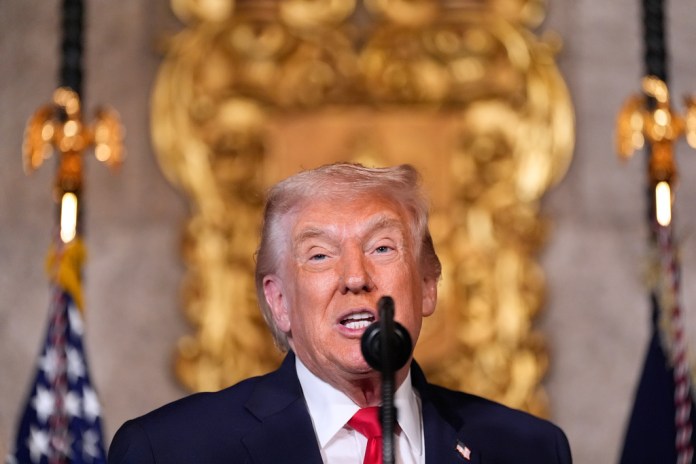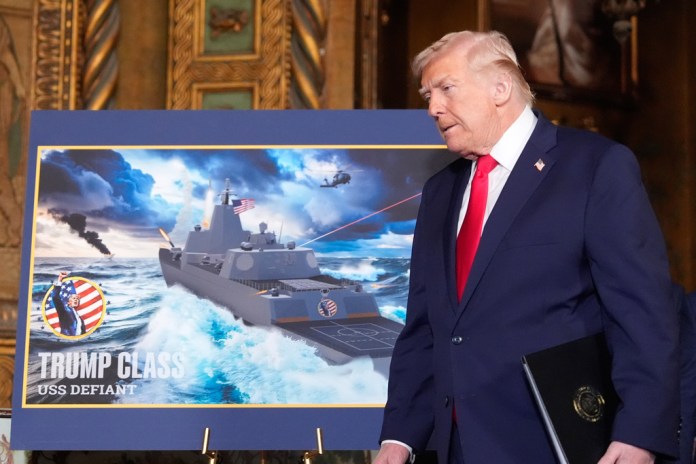Trump’s Critics Only Oppose His Tariffs Because They Oppose Him
The text discusses the expected economic policies of Donald Trump upon taking office, specifically regarding tariffs. It argues that imposing tariffs is not a novel or irresponsible move, as they have historically been a primary revenue source for the U.S. until the 20th century. Current tariffs exist on various imported goods, and many imported industrial products already enter the U.S. duty-free. The article notes that the Biden administration maintained Trump-era tariffs and emphasizes that tariffs are not inherently inflationary. It explains that inflation is primarily driven by monetary issues rather than tariffs and highlights that tariffs can serve as a consumption tax that benefits the economy when production and investment taxes are concurrently lowered.
The piece also mentions that tariffs can be aimed at encouraging certain behaviors from foreign countries, such as addressing illegal immigration. While acknowledging the theoretical appeal of free trade, the text argues that in practice, true free trade does not exist currently due to various trade barriers. Therefore, it suggests that tariffs could potentially be a means to reduce these barriers and improve trade outcomes for the U.S.
the essay asserts the importance of considering the political economy relationship, as neglecting economic interests can lead to public discontent, especially in light of challenges like high inflation. It emphasizes the need for a balanced approach to trade policies that protect American jobs and industries while pursuing strategic foreign relations.
When Donald Trump takes office, expect one of his first acts to be imposing tariffs. Despite his critics’ charges, tariffs are hardly unprecedented or responsible for many of the consequences for which they are blamed.
On Jan. 15, Trump wrote on Truth Social, “I am today announcing that I will create the EXTERNAL REVENUE SERVICE to collect our Tariffs, Duties, and all Revenue that come from Foreign sources.”
It is time to set the record straight on Trump and tariffs.
Except for the Civil War income tax’s life, tariffs were America’s primary revenue source until well into the 20th century. They didn’t just disappear once overtaken by taxes — they have been a constant revenue source since.
Tariffs already exist on many goods coming into the U.S., including anything that doesn’t come from the 20 countries we have trade treaties with. America has a trade-weighted average import tariff rate of 2.0 percent on industrial goods. With half of all America’s imported industrial goods entering duty-free, many goods face tariff rates above 2 percent.
The Biden administration didn’t revoke Trump’s China tariffs; they let these stand untouched for four years.
Tariffs are not inflationary: inflation is a monetary phenomenon — too much government-made money chasing too few goods — as Milton Friedman argued decades ago.
And tariffs won’t increase prices by the same percentage increase of an imposed tariff. This would only occur in the case of a product with inelastic demand (i.e., demand not falling with price increases) or no substitutes (i.e., no cheaper comparable products that could take its place).
As a consumption tax, tariffs are a more economically beneficial way to tax than America’s current taxes on production and investment (income, payroll, corporate, or capital gains). Of course, this beneficial effect only occurs if taxes on production and investment are lowered, and Trump has called for lowering taxes in these areas.
Neglected in the discussion of Trump tariffs is their explicit intention to press targeted countries to undertake certain desired behaviors (such as reducing illegal immigration in the case of Mexico — something already having an impact).
Yes, free trade is optimal. We all understand British economist David Ricardo’s theory of comparative advantage. However, free trade does not exist. Not here and certainly not abroad, where U.S. exports often face higher tariff rates than these countries’ imports face from the U.S. Free trade is great in theory, but it is time the U.S. sought lower trade barriers for its exports in practice. Tariffs can be a means to this end. And without them, don’t expect this to come, because thus far it hasn’t.
In its classical form, “political economy” was the study of economics and government. Today, we need to remember the linkage. We cannot expect Americans to support political outcomes that disregard their economic welfare. Doubters should ask the Biden-Harris administration how historically high inflation worked out for them.
Americans are understandably dubious about trade outcomes that hollow out our industries and eliminate their jobs and the geopolitical relationships where politicians trade market access for other strategic interests.
There are also security interests in play with trade. Everyone acknowledges that China has been engaged in a conflict with the West via its trade policies for years. Allowing technologically advanced items to be exported to China, which then uses them to strengthen its hand in its belligerent global goals, is beyond naïve; it is dangerous. The same can be applied to imports from China that could compromise U.S. security.
The same warnings about China could be applied to other countries — notably Russia. America has long withheld trade liberalization from nations it deems abhorrent or dangerous — witness sanctions against South Africa decades ago and sanctions that were rightfully put on Iran during the Trump administration (only to be relaxed by the Biden-Harris administration to Israel’s, and the world’s, detriment).
Tariffs and trade sanctions are not only invaluable in such circumstances, they are preferable to military engagement. Trade conflict as leverage to make an intermediate point in an increasing conflict is a step most Americans welcome over armed conflict. It also has a long historical precedent: presidents as far back as Jefferson and Madison have done likewise.
Much criticism of Trump’s tariffs — both imposed and proposed — is based on politics and the establishment media’s opposition to him. As Democrats and the establishment media’s silence at the Biden administration’s somnambulant trade policy of the last four years demonstrates, Democrats are hardly in a position to call out Trump on trade, and the establishment media is hardly in a position to play the role of unbiased arbitrator.
And, of course, criticism has also risen from those who have benefitted from America’s unequal trade relations such as the pallbearers of American manufacturing, who want to continue importing low-cost goods into the U.S. and have no interest in using American workers to produce items for export.
It is premature to criticize Trump’s tariffs before we have even seen what they are, on which products they are imposed, and what their ends are. A closer examination shows that critics’ claims about Trump tariffs are not about the facts behind tariffs, but are all about their opposition to him.
J.T. Young was a professional staffer in the House and Senate from 1987-2000, served in the Department of Treasury and Office of Management and Budget from 2001-2004, and was director of government relations for a Fortune 20 company from 2004-2023.
" Conservative News Daily does not always share or support the views and opinions expressed here; they are just those of the writer."




